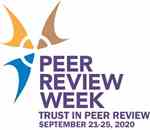Peer Review Week 2020: Why trust in peer review has never been so crucial
Published 22 September, 2020

At KeAi, we are proud to be a growing international publisher with strong Chinese roots. But we know that growth wouldn’t have been possible without the tireless efforts of our reviewer community.
Peer Review Week (PRW) is an annual event designed to highlight the critical role of peer view and recognize the hard work of reviewers. This year, PRW will focus on trust - an aspect of the evaluation process that has taken on new resonance as we tackle unprecedented global challenges, such as COVID-19 and climate change.
As respected authors and reviewers themselves, KeAi’s editors understand the importance of trust in the peer review process. And as many of their journals are in fields that will prove critical to addressing those global challenges, they know how vital it is that the papers they publish are robust, reliable, and trustworthy.
During the week of September 21 – 25, participating organizations will hold virtual events and activities to mark PRW. As part of our celebrations, we’ve asked some of our leading editors to think about peer review in terms of trust, transparency, and potential bias. Here is what they had to say.
View our short video interviews


On trust in peer review….

For Professor Matthew Chang, Editor-in-Chief of Biotechnology Notes, it’s “everything and it is becoming more and more important in today’s world, where the pace of scientific advancement is unprecedented and the mass of scientific knowledge is astronomically increasing. Given this speed and volume, the validity, quality, and originality of the scientific outputs cannot be assessed rigorously and properly without the sustainable partnership that is built on trust within scientific communities.”

For Professor Alexandros Asimakopoulos, Associate Editor of Environmental Chemistry and Ecotoxicology, a faster peer-review process could help to build trust. “The thing that is important to me, and many researchers I think, is the speed of the peer-review process. But speed has to do mostly with the availability of the reviewers. So, the question goes to how to motivate the reviewers to undertake the task? Through an incentive, or through another way?”

Professor Leon de Windt, Associate Editor, Non-coding RNA Research, believes that ensuring editors have the final say on a manuscript is crucial to maintaining trust. “Editors should judge a manuscript themselves, value the critique of the referees, but take it with a grain of salt and make a judgement call.”

While Professor Lixing Li, Executive Editor of China Economic Quarterly International, agreed that speed is key, like Professor de Windt, he believes editors should intervene more often: “It is both professional and responsible for a reviewer to read the manuscript carefully and to point out every error, mistake, and weakness. However, careful and lengthy reviewer reports sometimes lead to multi-rounds of revision, which usually delay the review process without much improvement of paper quality. The editor could play a more active role; for example, by giving a "revision" decision based on lengthy reviewer reports, or by giving explicit instructions to the author about which issues should be the focus of the revision.”

Professor Tilmann Weber, Associate Editor of Synthetic and Systems Biotechnology had a suggestion to speed up sharing of results: “I personally like a “hybrid” model, where manuscripts submitted to “conventional” journals are simultaneously posted on preprint servers – ideally even facilitated by the journal submission system.”
On greater transparency in peer review….
All our editors agreed that greater transparency was needed, but their views on the way to achieve that transparency varied.
Professor Chang noted: “Scientific communities, including publishers, have been steadily devising and experimenting with new peer review mechanisms which all embrace open identity, open report and open participation principles. Each mechanism has its own advantages and disadvantages, but one thing for certain is that our efforts should continue, and even intensify, to ensure that peer review remains a process that everyone in the scientific communities can put their trust in.”
For Professor Weber, publishing reviewer reports and the author’s responses to those reviews, was one option: “In my own experience, such reviews usually have a far above average quality and are normally far less biased. There is, however, also a backside – for such “published” reviews it is way harder to find reviewers – especially for topics from smaller research communities.”
Professor de Windt suggested identifying the names of the reviewers to authors, potentially after the final decision: “This will deter reviewers from being too critical and remain realistic.” He added: “Making authors names invisible doesn’t work; for a good peer review round, one needs to know what the author published before.”
On reducing bias in peer review…

Professor Kurunthachalam Kannan, Editor-in-Chief of Environmental Chemistry and Ecotoxicology, believes there is “innate bias in everyone” but sees an opportunity to mitigate that by “having additional reviews and by sending a paper that received biased reviews to an expert in the field, sometimes even with an incentive. Many journals are now open access and they charge fees for publication... reviewers should be paid some amount for their time to review, otherwise, very soon, good experts will not review papers.”

Dr. Julietta V. Rau, Associate Editor of Bioactive Materials, agrees that payment for reviewers would be a positive step forwards: “Reviewers should be chosen based on their CV and area of expertise and should be paid. Good journals should have funds for that. It is because of their high level of expertise that scientists usually refuse to review; if paid they wouldn't refuse.”

Professor Tao Zhang, Associate Editor of Materials Science for Energy Technologies, sees better monitoring of peer review as part of the solution: “Supervise peer review through the network and technology. Make peer review platform function more accurate, ensure the quality and efficiency of peer review, so as to reduce the existence of potential bias. At the same time, we can try our best to find peer reviewers of different genders, races and countries, to reduce bias as much as possible.”